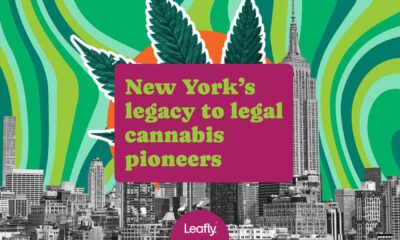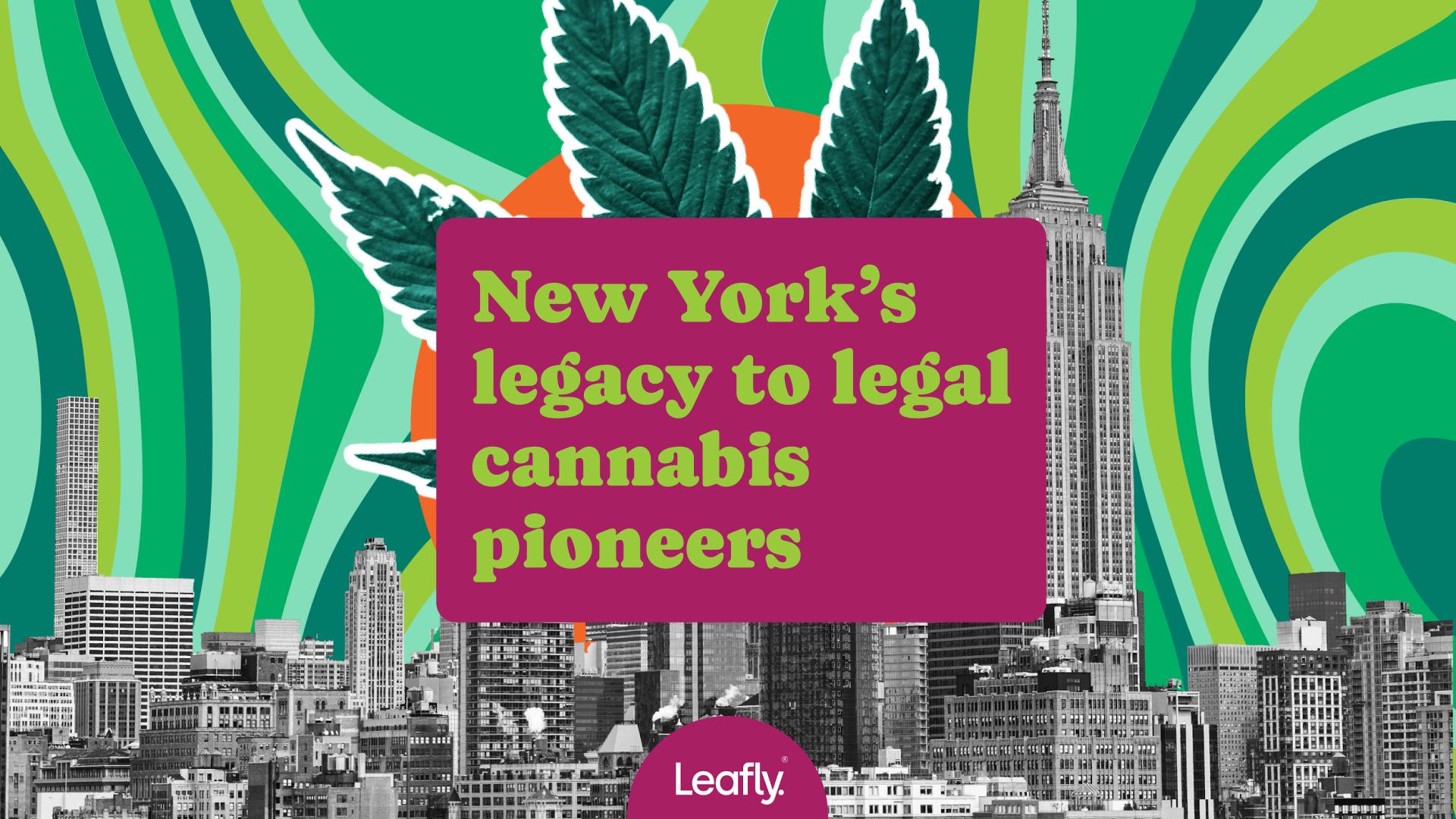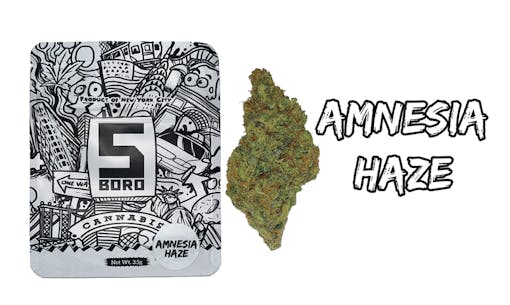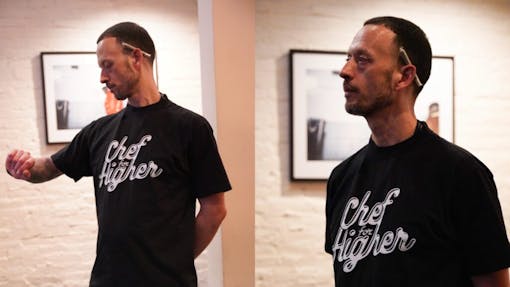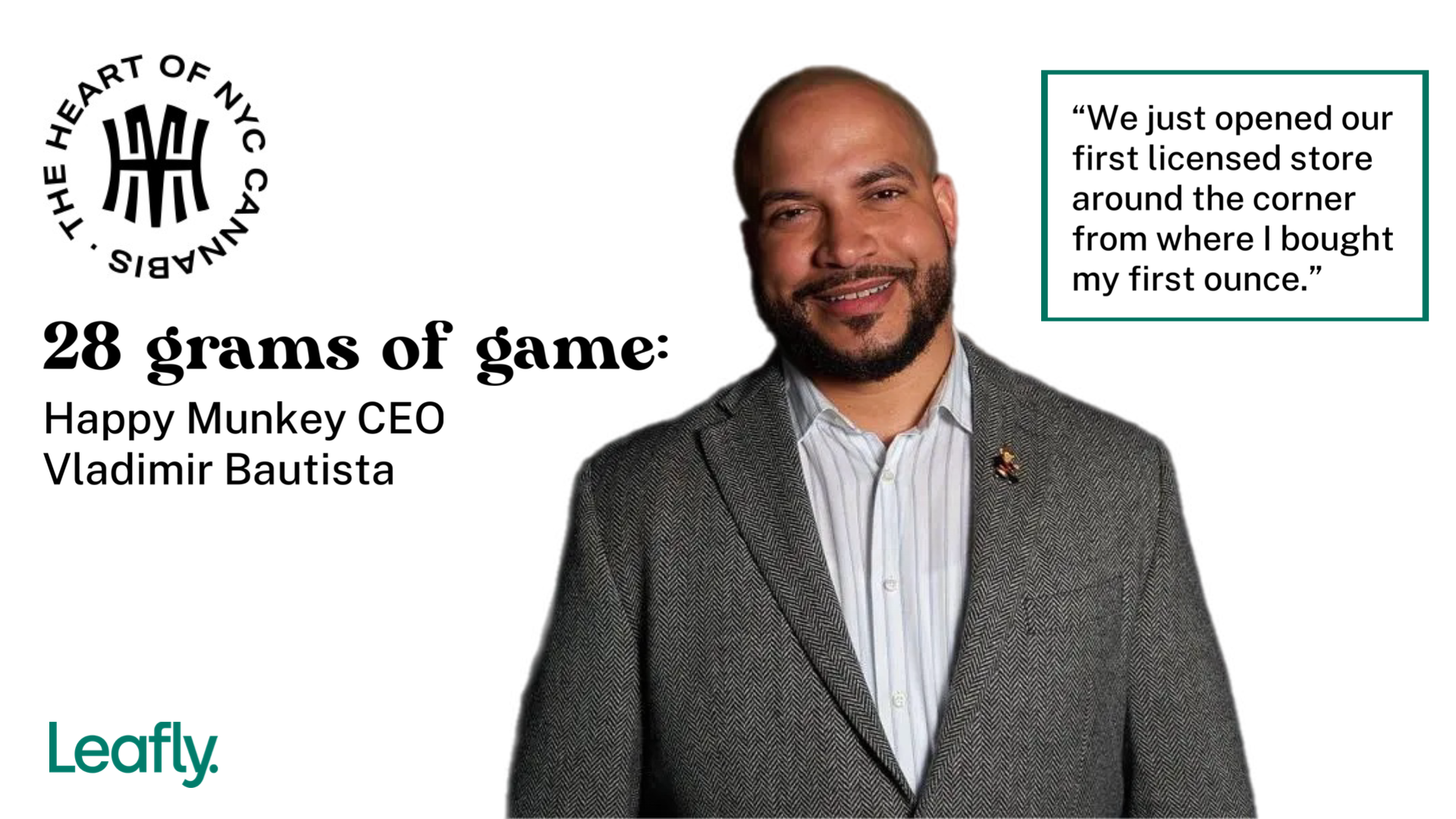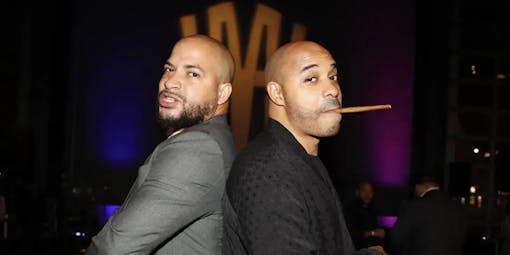
Here’s why Leafly is partnering with New York dispensaries to give you the best strains, brands, and events in 2024 and beyond.
In spite of strict regulations from the state, and endless competition from unlicensed stores, the members of New York’s Conditional Adult Use Recreational Dispensary (CAURD) program are going all-in. They were dealt delays, legal battles, and broken promises–so they formed the New York Cannabis Retail Association (NYCRA) to weather the storm together.
NYCRA is an organization that unites dispensary owners under the slogan ‘Collaboration Over Competition.” The association gives New York dispensary owners a private network to share resources and moral support through their odyssey to opening. The association is led by Jayson and Brittni Tantalo, owners of Flower City dispensary, as well as other CAURD license holders Coss Marte (ConBud dispensary) and Shanduke McPhatter, a nonprofit operator with his own license on the way.
Why should I shop at legal New York dispensaries?
New York is the first state to put citizens impacted by The War on Drugs first in line for dispensary licenses. By shopping with licensed brands and dispensaries in New York, you avoid untested products including mold and harmful toxins. You’re also supporting businesses that are majority owned by New Yorkers who were directly impacted by the War on Drugs.
New York’s history of criminalizing cannabis goes back to 1914, when the state first restricted everything except medical use. In 1927, possession and/or sales of cannabis were fully prohibited across the state. Federal prohibition followed in 1937.
Why is New York giving people with cannabis convictions the first dispensary licenses?
“Nowhere in this country was cannabis prohibition weaponized more methodically,” than in New York state, said former OCM chief equity officer Damian Fagon in 2022. According to the state, from 1980 and 2020, 1.2 million marijuana arrests occurred in New York, with almost 400,000 convictions.
How did cannabis become legal in New York?
In 2016, New York legalized medical cannabis. In 2021, former New York Gov. Cuomo signed the MRTA into law. The bill made cannabis legal across the state—promising no one would be arrested for the plant again—Not for selling it. Not for eating it. Not for smoking it on the street or inside their apartment building.
Where are you allowed to smoke cannabis in New York?
In New York State, smoking cannabis is now legal everywhere that smoking cigarettes is legal. Under the new cannabis laws, civil penalties (like fines) would be the maximum force the state could use to protect school zones, places of worship, and neighborhoods that voted against having dispensaries, farms, or smokers in their backyards or public parks and beaches.
Shop highly rated dispensaries near you
Showing you dispensaries near
Since Housing Works debuted in December, 2022, 141 dispensaries have opened across New York. And dozens more are popping up every month–grinding to meet the massive demand for pre-rolls, edibles, and concentrates across the Empire State. From Wall Street to MSG to Washington Heights–New Yorkers can even roll up legally on the subway (although we don’t recommend it in most situations).
How does New York law protect cannabis users and employees?
Most employees in New York are protected from cannabis testing or discipline for using outside of work. New York budtenders are even unionized. And as of this summer, hobbyist and craft home growers can openly cultivate up to 6-12 plants per household.
Since March 2021, New Yorkers have been encouraged to celebrate legalization freely. NYC’s Mayor told New Yorkers to “Light up” in May of 2022. But New York’s 20 million residents and 290 million annual visitors weren’t given legal stores to shop in, or public lounges to kick back and consume in for over two years. And most zip codes still don’t have a legal shop within walking distance.
How did New York get overrun by fake dispensaries?
Thousands of unlicensed dispensaries opened from 2021 to 2023 to fill the void. And public seshes and private membership clubs became the norm for connoisseurs and craft enthusiasts looking for higher grade products. But as more dispensaries open, nearby unlicensed shops and trucks are being raided and padlocked, as part of a joint effort between the city and state.
In December 2022, Mayor Eric Adams promised to shut down unlicensed dispensaries without criminalizing the offenders. So far, the raids, fines, and the threat of never becoming licensed are the only thing discouraging unlicensed storefronts.
It took a long time for licensed dispensaries to open after cannabis was legalized. Most states have a 1-2 year gap between cannabis laws being passed and actually taking effect (California took 26 months).
The state had to create the Office of Cannabis Management (OCM) to write and oversee regulations for the new market. Regulators had to review applications for licenses. So far, 141 of roughly 500 have been issued from the first round of CAURD applicants. Over 1,000 more licenses will be reviewed for existing medical dispensaries, large retailers from out of state, and common applicants who didn’t apply or qualify for the first round of licensing.
27-25 44th Dr, Long Island City, NY — recreational

Trends is New York’s 100th Legal Dispensary. They soft-opened in March, and are celebrating their grand opening with Leafly July 10, 2024 (RSVP here)
How many unlicensed New York dispensaries are there now?
New York State and City officials said there were roughly 2,800 unlicensed dispensaries in the state before the recent crackdown. Instead of waiting for the state to roll licenses out, some New Yorkers took the opportunity to jump into the booming grey market.
From small bodegas and delis serving pre-rolls and eighth bags, to large brick-and-mortar stores that resemble real dispensaries from other states, it’s hard to walk two blocks without seeing a cannabis store or delivery flier.
Studies show that some stores sell reject products from other states that include heavy pesticides, mold, and toxins like aluminum. A group of unlicensed store owners who disagree with the licensing process and crackdown are challenging the state in court.
The OCM told Leafly in 2022 that legacy operators who use old fashioned discretion should have no problem from enforcement. On the other hand, advertising cannabis in a store or posing as a legal dispensary has never been part of the legacy game and will not be a viable business option under the current laws and regulations.
Why doesn’t NY shut down fake dispensaries?
Since the law now forbids arresting anyone for cannabis, the stores that chose to start selling don’t have much reason to stop. Some are being raided and padlocked by state and city officials. But the state doesn’t have much leverage beyond confiscating products, padlocking stores, and fining landlords, according to current laws and regulations. In May, state officials said they shut down over 233 illegal smoke shops out of an estimated 2,800.
Who are the Legacy operators and pioneers in New York cannabis?
While state regulators have said they intend to shut down all unlicensed stores, New York’s cannabis key-holders support the legacy market. The New York cannabis community takes pride in honoring the activists and pioneers who made legalization possible. They give flowers at events, and through product drops that empower pioneers.
NYC Cannabis Cazar Dasheeda Dawson coined the term legacy for cannabis pioneers who made legalization possible. NYC’s first grand marshal of cannabis Shiest Bubz explained to Leafly why he’s taken ownership of the term with his Legacy Adventures NYC experiences, including a stoner summer camp at the THC Museum, and a private 420-your around the city’s cannabis landmarks.
Here are some of the key legacy-to-legal players to follow in New York cannabis:
- Juice bar legend and future dispensary owner Branson
- Legacy Adventures NYC founder Shiest Bubz (first grand marshal of NYC Cannabis)
- Happy Munkey co-founders Vlad and Ramon
- Smacked Village co-owners Roland Conner and Patricia Conner
- Chef For Higher co-founder Hawaii Mike
- ConBud owner Coss Marte
- GUMBO co-founders Luka Brazi and Alexis Major
- 5Boro Cannabis founder Timothy Auyeung
- La Marina Boyz co-founders Kev, Ivan, Joe, and Sharkbite
- Trends co-owner Rodney Carter
What’s a fake dispensary and why don’t I want to shop there?
Since New York’s MRTA swore no one would be arrested for cannabis again, thousands of stores and brands have popped up to fill New York’s huge demand for cannabis.
These are not to be confused with the infamous juice bars of 80s and 90s Harlem that helped pioneer the modern cannabis trade. Unlicensed stores are not run by people who savvy New Yorkers taking advantage of a gap in the market.
“You wouldn’t buy your groceries from there,” points out an anonymous legacy-to-legal operator who said they would never buy bud from a deli or unlicensed store that’s posing as a real dispensary. “Look at what they sell in there. You think they’re selling you good weed?”
For decades, weed lovers worldwide have trusted Shiest Bubz to lead them to New York’s best bud. As the city’s first Grand Marshal of cannabis, Bubz speaks for many legacy operators who lobbied, invested, and waited for the opportunity to go legal. They are now losing margins to people who never sold weed in their life.
In December 2022, Bubz addressed critics who asked why a dealer was dealing with the Mayor and state officials at a press conference.
“The legacy [community] that was present was there to voice our opinions on how to protect and assist Black and brown people [looking] to succeed in this cannabis industry,” Bubz posted to Instagram. “I represent the Black market, and the Legacy to Legal motto,” Bubz wrote, “I want my equity, as should you!”
When will New York’s unlicensed cannabis shops be shut down?
Recent raids of 535 unlicensed city shops ($17.5 million in illegal cannabis products seized and $43 million in fines for store owners) and 114 unlicensed stores upstate sent many New Yorkers scrambling for a new plug. Licensed stores are now facing shortages of flower as a flood of new customers are coming from shuttered shops. According to OCM official John Kagia in a 2023 Business of Cannabis panel with Leafly, it could take up to 10 years for the thousands of unlicensed stores to be closed and replaced with licensed operations.
Who are the owners of New York’s first legal dispensaries?

New York set out to be the first in the nation to give citizens most affected by the state’s harsh War on Drugs enforcement the first chance to profit from the new legal cannabis market. New York City arrested more people for cannabis than anywhere else in the world according to state data.
So a select group of about 500 business owners were granted the first dispensary licenses after meeting the state’s strict criteria. Many more licenses are currently in the pipeline. So far 141 stores have opened across the state.
How did New York dispensary owners qualify for licenses?
New York dispensary applicants had to meet a combination of these requirements:
- Proof of non-violent cannabis arrest or charge for the individual or a family member
- Residency in a NY zip code that was disproportionately impacted by state drug enforcement
- Membership in protected minority groups including disabled veterans, women, Black, Asian, or LatinX
- Applicant had to operate a legal business or non-profit that was in good standing with the state
- Could not have more than 5-10% ownership in public or private cannabis business in another state that may create conflicts of interest
New York state wanted small business owners to have a leg up on large corporations from other states. The rules were made to prevent undue influence from impacting what brands a store owner chooses to stock and promote. That includes a strict separation between retail and supply licenses.
Why is New York’s legal cannabis rollout such a mess?
Regulators set New York’s dispensary guidelines after studying New York’s liquor store market, as well as the other states and countries that legalized first.
Since New York dispensaries are limited by zip code, having a license should be a solid path to generational wealth–as long as stores can stay open and curate the best products. Just like your local liquor store can’t be owned by a major distributor like Jack Daniels, regulators want a clear separation between retail store owners and the brands they choose to promote.
To avoid conflicts of interest, dispensary owners are not allowed to own significant equity of cultivation brands in New York, or other states. So a major California brand like Cookies must collaborate with local licensees to reach the New York market with their products. They can’t own a Cookies store, because regulators don’t want them to throw their weight around for shelf space or favorable deals from rival stores. That regulation led to a creative partnership called Culture House, which is currently open at Herald Square in the heart of Manhattan.
These regulations—though well-intentioned—have not all gone as planned. Lawsuits, restrictions on marketing, and inconsistent supply & demand have led to a beautiful mess for operators and consumers so far. But things are looking up as more stores open, and more brands hit the market.
When will New York’s adult-use dispensaries get indoor flower?

Indoor is coming. Early regulations limited cultivators to outdoor and mixed-light setups. But brands like Dank by Definition, MFNY, and Lobo are rolling out fire flower that can now compete with the quality in other states. Heavy smokers were disappointed by the first wave of flower on legal shelves in 2023, but many old school, beginners, and moderate users appreciated the lower-THC options. By the end of 2024, more legal brands will be delivering dank on a regular basis.
Who are New York’s top homegrow and craft growers?
New York’s homegrow laws will soon allow hobbyists and craft growers to bring their underground brands to the legal market through grower showcases and licensing deals. Craft brands like Godmother’s Garden and Semper Frosty currently compete in local showcases like The New York Grower’s Cup. And at the PiffCon Haze convention last June, haze-enthusiasts gathered to celebrate one of New York’s most beloved strains.
Joe Lo Castro, aka Joe Grows, is a former lawyer who’s been growing since 2013. The Queens native applied for a micro license in the state’s second round of applications, but he’s not optimistic about his chances of getting selected among the thousands of applications.
“I’m an Italian guy from Queens, there’s no social equity box for that,”said Joe Grows. Instead of waiting around, Joe’s building a “how to grow for dummies” brand plus an affordable seed bank that will encourage more New Yorkers to take up the craft. “The name of my book is Grow Dumb: The Average Joe’s Guide to Growing Cannabis because I’ve never seen a simple, straight forward guide on how to grow indoors, in small spaces, at a low cost.” From there, Joe plans to release seeds and accessory kits for beginners and purists, while consulting cultivators who get licensed before he does.
What’s next for New York cannabis and how will it impact the national market?

Since federal law still schedules cannabis as a controlled substance, every state is free to govern the plant how local lawmakers see fit. The fractured national market has played out like a science experiment. Local politics and national limitations on banking, marketing, and supply chain are the defining factors of each market. And they’re limiting everyone’s growth. That’s why Leafly stands with New York’s legal dispensaries and legacy cannabis brands grinding to stay in business.
With New York consuming more cannabis than anywhere else in the world, it will soon be the premier proving ground for growers and grinders from around the world looking to leave a legacy in the legal market. If a brand can make it here, they can make it anywhere, right?
The first batch of local farms and stores are growing against heavy regulations. While out of state brands are itching to join the new world capital of weed when regulations permit later this year.
What is New York’s homegrow and craft cannabis scene like?
In New York, a rich craft cannabis market has emerged post-legalization. Local legends and upstarts are branding their bud as New York’s finest hoping for a shot at the legal market.
“My favorite craft cannabis growers in New York right now are The Mechanic, Smokey’s Bodega , Odee Trees, EPIPHANY, and Fu’s Flower right now, but there is a lot of underground talent in New York that’s about to come to light on the legal market soon.”
Robb Reefa, The Reefa Report
Craft batches of cannabis (between 50 to 100 pounds at a time) are seen as superior by aficionados like Robb Reefa, a budtender and cannabis reviewer who recommends cannabis grown by local experts who’ve mastered the climate and energy management needed to grow New York’s very best flower.
“Growing weed is a 120-day performance. Your soul has to be in it. Even if it’s just a hobby.”
Joe Grows, author of Grow Dumb: The Average Joe’s Guide to Growing Cannabis
Leafly helps NY cannabis shoppers find the strains and brands they love
Since 2010, Leafly has stood with legacy cannabis growers, providers, and consumers who want to learn more about their cannabis. Leafly is an online marketplace that connects licensed operators with customers who want to buy the best, most reliable products. Each year, 70 million people visit our strain database, brand profiles, and dispensary reviews so that they can know what they’re smoking, every time.
Subscribe to What are you smoking?: New York for more of the latest info on New York cannabis. Only on Leafly.













